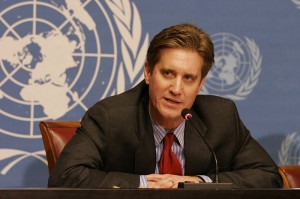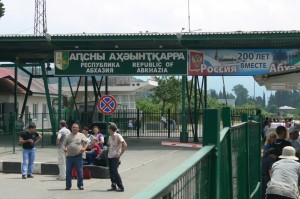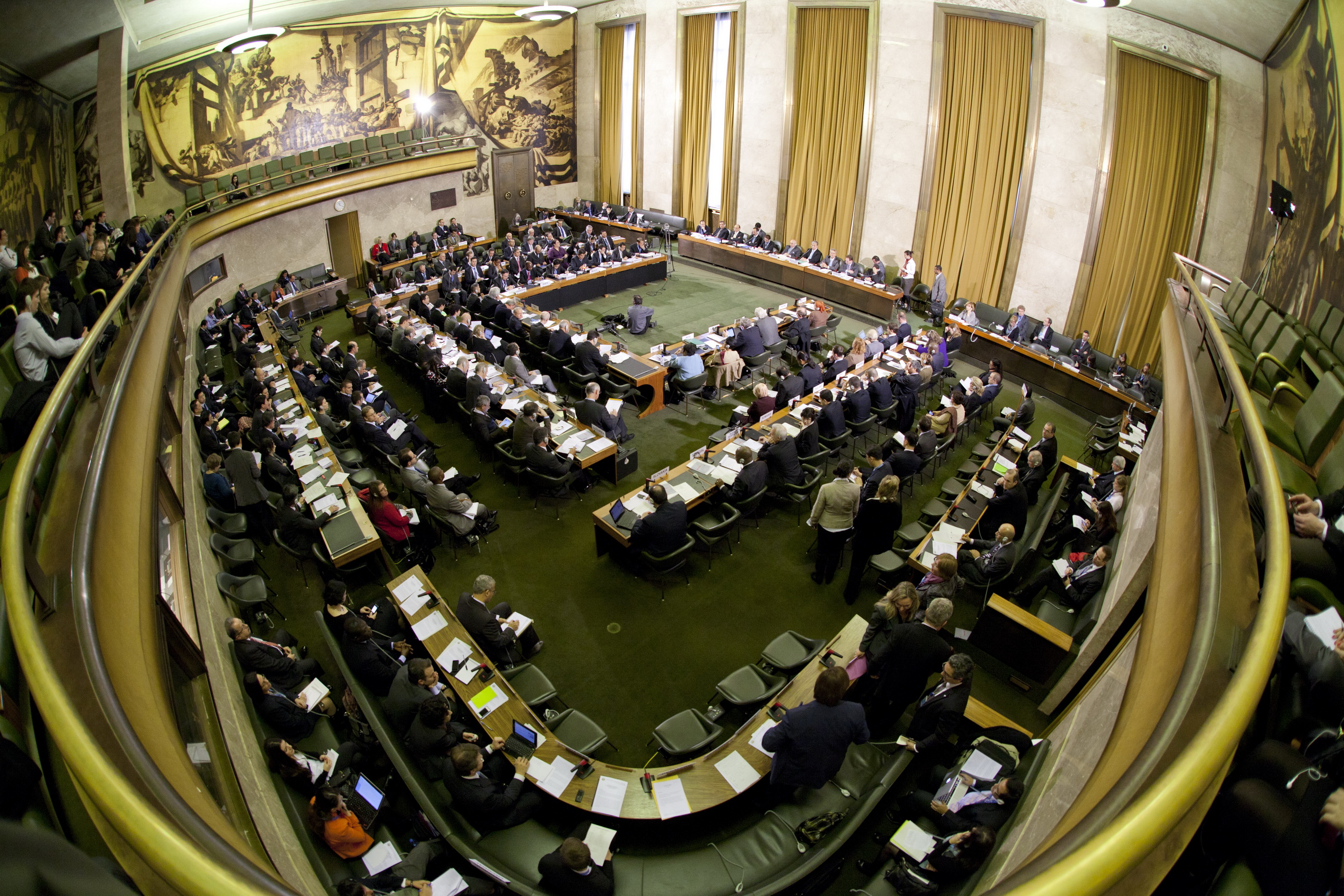It was the twenty-eighth time that they met and the twenty-eighth time that their encounter came to naught. On June 18th 2014, the Geneva Talks over Georgia’s territorial conflicts were interrupted once again when participants from the country’s two disputed territories, Abkhazia and South Ossetia, abandoned one of the working groups.
Since the talks were launched in October 2008, they have been frequently stalled by walk-outs. But many observers maintain a firm belief that the discussions play a valuable role in conflict resolution in the South Caucasus.
Considering they are the only line of contact between all of the sides involved, they may just be right.
The Talks…
Following the August 2008 war between Russia and its small neighbour to the south, the Organization forSecurity and Cooperation in Europe (OSCE) declared that a forum was to be established to bolster security in the region. The military confrontation between Moscow and Tbilisi had come to an end, but only after the intervention of French President Nikolas Sarkozy, whose country held the EU Presidency at the time.

Matthew Bryza, U.S. Deputy Assistant Secretary of State for European and Eurasian Affairs, speaking in Geneva following talks on Georgia, U.S. Mission Photo: Eric Bridiers
During the negotiations, Sarkozy and his Russian counterpart, Dmitry Medvedev, scrambled together a Six-Point Ceasefire Plan, after which an international mediation process would commence. Aside from the obvious participants –Russia and Georgia– the European Union (EU), the Organization for Security and Cooperation in Europe (OSCE), the United States and the United Nations were all penned as participants. Additionally, Russia insisted that officials from Abkhazia and South Ossetia participate in the foray, and the Georgians eventually acquiesced. Thus the Geneva talks for Abkhazia and South Ossetia were born.
Spectacular Obstacles
Since their inception, the Geneva talks have been mired in the murky waters of status. Failing to get off to an auspicious start, the first meetings were suspended after Abkhaz and South Ossetian representatives declared they would only participate in the discussions as equals. The Georgians, meanwhile, refused to recognize them as such. Representatives of the disputed territories were thus forced to meet with international mediators separately.
Determined to begin somehow, the organizers divided the negotiations into two separate forums: plenary sessions attended by officials from Russia, Georgia and the U.S, and two informal working groups that include representatives from Abkhazia and South Ossetia and take place under the watchful eyes of the EU, the OSCE and the UN.
To avoid any semblance of international recognition during these officially informal meetings, the working groups take place without the names Abkhazia or South Ossetia being uttered, and the provinces’ representatives are identified by their given names only. The first working group focuses on security issues and the other tackles the plight of Internally Displaced Persons (IDPs).
Following these arrangements, the Geneva Talks were able to commence, but not without running up against a number of additional obstacles. Walk-outs during the working groups soon became customary. In 2010, for example, discussions about “Agreed Undertakings” ended abruptly after Abkhaz and South Ossetian representatives vacated the premises.
The “Agreed Undertakings”, which deal with the supply of water, the rehabilitation of damaged facilities and the return of refugees, among other issues, were especially problematic for the Abkhaz representatives due to questions of demographics. According to an Abkhaz census conducted in 2003, only 94,000 people out of a total population of 214,000 were ethnic Abkhaz. There were 43,600 Georgians at the time, meaning that if more than 200,000 Georgian IDPs returned to Abkhazia, the Abkhaz would once again be an ethnic minority in their recently proclaimed homeland. This was a fate Sokhumi was loath to accept, meaning that all discussions surrounding the return of Georgian IDPs to Abkhazia are permanently stalled.
Shortly thereafter, in 2011, the Georgian side of the negotiating table also threatened to abandon the discussions after authorities arrested several individuals claiming to have been hired by the Russian military to plant bombs inside of Georgia. Tbilisi also threatened to block Russia’s membership to the World Trade Organization over the incident.
However, demonstrating a considerable amount of diplomacy, Tbilisi eventually chose not to follow through with either of the threats and the meetings continued forward, albeit with mutual accusations slung from either side.
The inability of all of the parties involved to reach an agreement on the adoption of a joint statement on the non-use of force also led to the failure of the 26th round of talks in 2013. Debates about the joint statement dragged on as Tbilisi insisted that the text should include a reference to Moscow’s obligation to undertake a non-use of force pledge. Russia, meanwhile, flatly refused to make such a promise.
It has also proven impossible to convince Russia to stop vetoing the presence of UN and OSCE missions in both disputed territories. Instead, the Kremlin signed border treaties state that until the territories form their own border patrols, they delegate authority to the Russian Federation to guard their de facto borders. Currently, only Russian soldiers are present on the administrative boundary lines that separate Georgia proper from Abkhazia and South Ossetia.

Border between Abkhazia and Russia with a sign that reads ‘Russia and Abkhazia: 200 Years Together’, Wikimedia
In Georgia, many are frustrated by what they see as Russia calling all of the shots, insisting on its own military presence in the two breakaway provinces, refusing to commit to a non-use of force pledge, and continuously provoking Tbilisi by extending the administrative boundary line illegally in a process now known as “borderisation”.
Trifling Achievements
But despite the continuous difficulties, the parties have reached some minor agreements. One of these is the “proposals for joint incident prevention and response mechanisms”, drafted in February 2009. The document aims to avoid violent incidents and prevent criminal activity on all sides of the administrative boundaries. It also sets the conditions for the effective delivery of humanitarian aid. Mechanisms to reach these goals include joint visits to the areas of concern and a 24-hour hotline.
Moreover, following the change in government in Georgia in 2012, the relationship between Georgian officials and their de facto counterparts from the disputed territories appeared to improve, sparking hopes that the two sides would find further ways to cooperate.
“Representatives from Georgia, Abkhazia and South Ossetia moved from empty rhetoric and exchange of insults to the discussion of practical issues,” Russian Deputy Foreign Minister Grigory Karasin said to the Russian news agency Itar-Tass.
One More Round
But during the talks on June 18, demographics were once again an issue of contention. Backed by a Russian negotiator, representatives from Sokhumi and Tskhinvali demanded that the issue of IDPs and refugees be removed from the meeting’s agenda.
Their demand was sparked by the UN General Assembly’s decision on June 5 to pass a non-binding resolution on IDPs. Russia views the resolution, which was sponsored by Georgia and passed for the 7th year in a row, as counterproductive to the aims of the Geneva talks. Abkhaz and South Ossetian officials, meanwhile, piggybacked on this sentiment, using it to drive home their position that the issue of IDPs’ return should be removed from the discussions altogether.
This most recent walkout left Georgian officials sending pleading looks to their international supporters. “We are grateful to co-chairs for their firm and clear stance on retaining the Geneva international discussions in its format and agenda,” the Georgian chief negotiator stated.
But it has now, perhaps more than ever, become clear that Georgia’s gratitude will do little to resolve the issues on the ground or return Abkhazia and South Ossetia to Georgian rule.
Westward Defiance
This additional breakdown just a week before Georgia signed an Association Agreement with the European Union is indicative of the defiant attitudes prevalent in Sokhumi and Tskhnvali. Tbilisi has long believed that further integration with the West is the only solution to its problem of secessionism. Were Russia to relinquish its grip on these regions, the Georgian logic goes, it would only be a matter of time before Abkhaz and South Ossetia officials acquiesced and fell back into the folds of Georgia’s territorial integrity. In this context, officials believe that increased integration with the West will make up for its inability to compete militarily with Russia. Meanwhile, the de facto officials from Sokhumi and Tskhnvali are sending a clear signal to Tbilisi that its ties with Brussels will be far from sufficient to achieve these aims.
Nevertheless, considering the lack of alternatives, the show must go on, and the next round of talks is scheduled for October 8 2014. It remains to be seen, however, whether this round’s participants will remain seated.
This is a non-profit explanation







Pingback: Unsolved conflicts as obstacles for return of Georgia’s IDPs | Displaced in Georgia